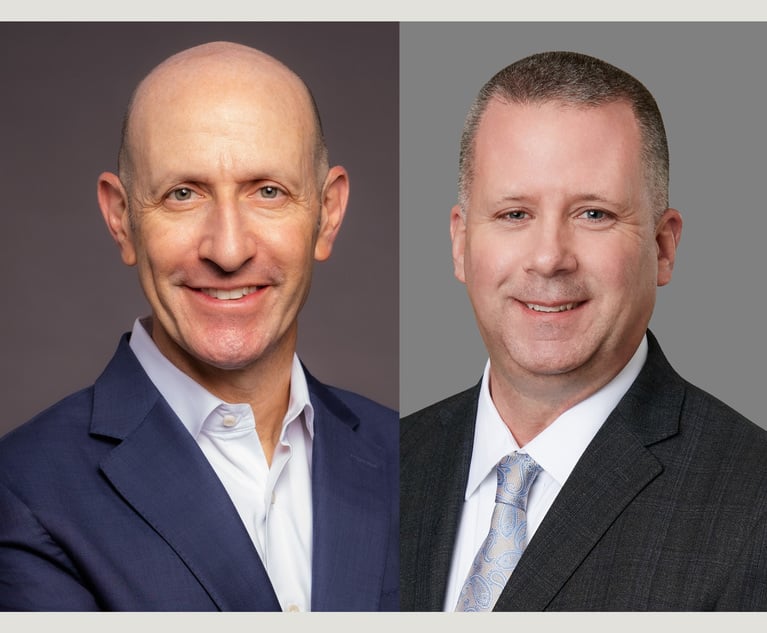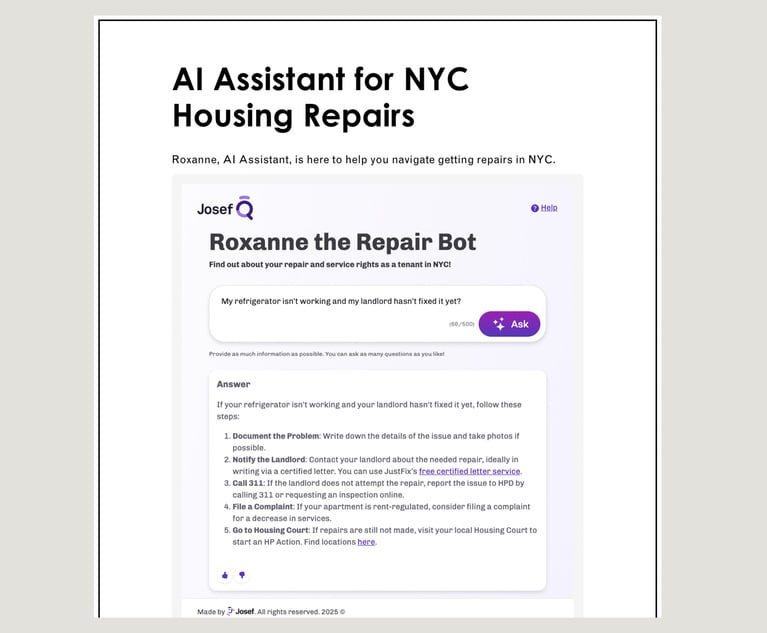'Extreme,' 'Vicious' Trump Statements Put DACA Decision on a Different Level, Judge Says
In a sprawling hearing to address competing motions for an injunction by plaintiffs and dismissal by DOJ over the DACA wind-down, U.S. District Judge Nicholas Garaufis once again took aim at statements made by the Trump administration.
January 30, 2018 at 05:15 PM
5 minute read
 Judge Nicholas Garaufis.
Judge Nicholas Garaufis.
U.S. District Judge Nicholas Garaufis of the Eastern District of New York made clear during a hearing Tuesday in the Deferred Action for Childhood Arrivals rescission suit that attempts by the Justice Department to treat the matter like an “ordinary” agency decision were going to fail.
“How can I do that,” Garaufis asked Stephen Pezzi, a DOJ trial attorney presenting on behalf of the government, given the “injurious and unfair” comments made by Donald Trump before and after becoming president. The president's statements about Latinos, Mexicans and other foreigners were “extreme,” “vicious,” and “recurring,” the judge said.
“It's a different kind of commentary,” he continued, adding that the government was trying to “wipe the slate clean” in an attempt to have its decision to wind down the DACA immigration program be treated in such a way that would immunize it against litigation and court review.
That's just what DOJ attorneys were asking Garaufis for at the hearing in Brooklyn, as the federal judge weighed competing motions—one from DOJ to dismiss the two linked DACA suits, and the other, by individual defendants in one case and attorneys general from 16 states in another, to issue an injunction to stop the wind-down. Additionally, the individual plaintiffs have asked for class certification.
Hanging over the hearing were two actions that could potentially impact Garaufis' decision.
The first, and most immediate, is a request for the U.S. Court of Appeals for the Second Circuit to grant interlocutory appeal, on behalf of the government, on a November decision issued by Garaufis that asserted the court's ability to adjudicate the case.
From the bench, Garaufis expressed some confusion about papers filed with the appellate panel overseeing the appeal last week. Both parties at the hearing Tuesday clarified that they agreed that the Second Circuit should hold off deciding the appeal until Garaufis decided on the injunction motion and the motion to dismiss.
The second issue, while more remote, presented an even larger issue. Should the court even weigh in on the motions, considering the writ of certiorari now before the U.S. Supreme Court, over whether the current DACA policy is judicially reviewable and lawful?
That suit, which rose out of a ruling by U.S. District Judge William Alsup of the Northern District of California, has sought to skip the appellate process to the Ninth Circuit entirely in favor of having the Supreme Court rule ultimately on the ability of court's to review the DACA decision.
The plaintiffs argued that Garaufis should not wait. Specifically, as Karen Tumlin, an attorney with the National Immigration Law Center, argued, the current set of cases presented different issues and different case procedures than the California suits. She noted that among her clients were individuals not covered by the national injunction issued by Alsup because they became potentially eligible for DACA after the program rescission began last year. Alsup's order, she said, only covered those who were already participants in the program.
Throughout the proceedings, Pezzi pressed the government's core contentions. The first remains that, following previous litigation that went all the way to the Supreme Court over DACA's sister policy, the Deferred Action for Parents of Americans, or DAPA, the Trump administration believed that the threat of litigation was so great that the best move was to disassemble the “materially indistinguishable” DACA policy.
Additionally, the government argues, under the current U.S. attorney general, Jeff Sessions, the overall legality of the program has been questioned, leading to a need to unwind it. Lastly, these decisions were done in a way that prevents judicial review under the Administrative Procedure Act.
Garaufis expressed clear displeasure at some of the ways Sessions has characterized the debate about the DACA rescission. He noted the attorney general's October speech before the Heritage Foundation, where he took direct aim at Garaufis' prior criticisms of the president.
“The Constitution gives judges no right to veto a president's actions because they disagree on policy grounds,” Sessions said.
On Tuesday, Garaufis pushed back against Pezzi's statements about the Sessions' views on legality and what is inside the purview of the courts, recalling the attorney general's previous comments and asking if Sessions was there in the courtroom. Pezzi affirmed that he was not. Garaufis said that it was “better that he's not.”
The judge would go on to challenge the government's position on potential litigation around DACA, as the potential is in many ways ever present. He noted that the actions around DAPA at the heart of the government's argument began with a decision by “a district judge, like me” who put in place an injunction that was upheld by the appellate court before a 4-4 split of the Supreme Court effectively left that decision in place.
New York Attorney General Eric Schneiderman attended the hearing. After the hearing, during an emotional press conference with both sets of plaintiffs, he said that, considering the 16 states suing over the current DACA decision, the Trump administration's litigation concerns showed “they got it wrong.” He called for Garaufis to issue a decision in the case so “as full a record as possible” could be presented should the case also make its way to the Supreme Court.
“We want to get a decision from this judge to supplement the record,” he said. “This fight is far from over.”
This content has been archived. It is available through our partners, LexisNexis® and Bloomberg Law.
To view this content, please continue to their sites.
Not a Lexis Subscriber?
Subscribe Now
Not a Bloomberg Law Subscriber?
Subscribe Now
NOT FOR REPRINT
© 2025 ALM Global, LLC, All Rights Reserved. Request academic re-use from www.copyright.com. All other uses, submit a request to [email protected]. For more information visit Asset & Logo Licensing.
You Might Like
View All
Meet the Long Island Judge Tapped to Be US Attorney for Eastern District of New York
2 minute read
New York’s Property Tax Incentives and Abatements Make Development Feasible
7 minute read
Josef Partners With NYU, Housing Court Answers to Launch AI Assistant Built for Tenants

Trending Stories
Who Got The Work
Michael G. Bongiorno, Andrew Scott Dulberg and Elizabeth E. Driscoll from Wilmer Cutler Pickering Hale and Dorr have stepped in to represent Symbotic Inc., an A.I.-enabled technology platform that focuses on increasing supply chain efficiency, and other defendants in a pending shareholder derivative lawsuit. The case, filed Oct. 2 in Massachusetts District Court by the Brown Law Firm on behalf of Stephen Austen, accuses certain officers and directors of misleading investors in regard to Symbotic's potential for margin growth by failing to disclose that the company was not equipped to timely deploy its systems or manage expenses through project delays. The case, assigned to U.S. District Judge Nathaniel M. Gorton, is 1:24-cv-12522, Austen v. Cohen et al.
Who Got The Work
Edmund Polubinski and Marie Killmond of Davis Polk & Wardwell have entered appearances for data platform software development company MongoDB and other defendants in a pending shareholder derivative lawsuit. The action, filed Oct. 7 in New York Southern District Court by the Brown Law Firm, accuses the company's directors and/or officers of falsely expressing confidence in the company’s restructuring of its sales incentive plan and downplaying the severity of decreases in its upfront commitments. The case is 1:24-cv-07594, Roy v. Ittycheria et al.
Who Got The Work
Amy O. Bruchs and Kurt F. Ellison of Michael Best & Friedrich have entered appearances for Epic Systems Corp. in a pending employment discrimination lawsuit. The suit was filed Sept. 7 in Wisconsin Western District Court by Levine Eisberner LLC and Siri & Glimstad on behalf of a project manager who claims that he was wrongfully terminated after applying for a religious exemption to the defendant's COVID-19 vaccine mandate. The case, assigned to U.S. Magistrate Judge Anita Marie Boor, is 3:24-cv-00630, Secker, Nathan v. Epic Systems Corporation.
Who Got The Work
David X. Sullivan, Thomas J. Finn and Gregory A. Hall from McCarter & English have entered appearances for Sunrun Installation Services in a pending civil rights lawsuit. The complaint was filed Sept. 4 in Connecticut District Court by attorney Robert M. Berke on behalf of former employee George Edward Steins, who was arrested and charged with employing an unregistered home improvement salesperson. The complaint alleges that had Sunrun informed the Connecticut Department of Consumer Protection that the plaintiff's employment had ended in 2017 and that he no longer held Sunrun's home improvement contractor license, he would not have been hit with charges, which were dismissed in May 2024. The case, assigned to U.S. District Judge Jeffrey A. Meyer, is 3:24-cv-01423, Steins v. Sunrun, Inc. et al.
Who Got The Work
Greenberg Traurig shareholder Joshua L. Raskin has entered an appearance for boohoo.com UK Ltd. in a pending patent infringement lawsuit. The suit, filed Sept. 3 in Texas Eastern District Court by Rozier Hardt McDonough on behalf of Alto Dynamics, asserts five patents related to an online shopping platform. The case, assigned to U.S. District Judge Rodney Gilstrap, is 2:24-cv-00719, Alto Dynamics, LLC v. boohoo.com UK Limited.
Featured Firms
Law Offices of Gary Martin Hays & Associates, P.C.
(470) 294-1674
Law Offices of Mark E. Salomone
(857) 444-6468
Smith & Hassler
(713) 739-1250






